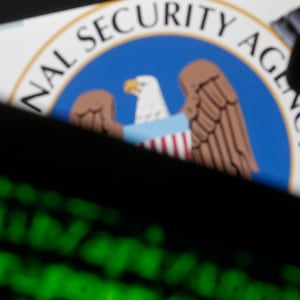The FBI, without any court order, sifted through the National Security Agency’s massive troves of foreign communications for information on American “racially motivated violent extremists,” a newly declassified order from the secret surveillance court details.
Even though the Foreign Intelligence Surveillance (FISA) Court warned the FBI in 2018 that its warrant-free queries, known as backdoor searches, were constitutionally alarming, the bureau still conducted queries relevant to criminal investigations about, among other things “domestic terrorism involving racially motivated violent extremists.” The court’s Judge James E. Boasberg found what he referred to as “apparent widespread violations of the querying standard.”
That’s the euphemistic term the bureau tends to use to denote white supremacist violence. On one occasion, an FBI analyst ran a multi-search-term “batch query” on Americans “in connection with predicated criminal investigations relating to domestic terrorism” that returned 33 foreign surveillance results.
And not only domestic terror. The FISA Court recounts government acknowledgment that at least 40 FBI searches through the NSA’s warrantlessly collected data involved “health care fraud, transnational organized crime, violent gangs” and “public corruption and bribery.”
On at least one occasion, around May 2020, an FBI analyst looked through the foreign NSA troves “to vet [a] potential source in [a] predicated criminal investigation relating to public corruption.” Seven FBI field offices were implicated in “these and a number of similar violations,” according to a November 18, 2020 FISA Court opinion declassified on Monday and signed by Boasberg.
In other words, the FBI continues to perform warrantless searches through the NSA’s most sensitive databases—the ones the NSA is not required to get warrants before filling with communications information—for routine criminal investigations that are supposed to require warrants.
Doing so potentially jeopardizes an accused person’s ability to have a fair trial since warrantlessly acquired information is supposed to be inadmissible. The FBI claimed to the court that none of the warrantlessly queried material “was used in a criminal or civil proceeding,” but such usage at trial has happened before.
In general, the FBI and related agencies can query the allegedly foreign-focused NSA communications databases for information on Americans for a designated national-security purpose—to uncover “agents of a foreign power,” such as spies or foreign terrorists. But none of the identified FBI queries “was related to national security,” the Court found. Under the relevant surveillance law, the FBI is supposed to return to the FISA Court for a warrant to query the troves for a non-national security purpose. The Court found the bureau did not.
The revelation of the FBI’s continuing backdoor searches comes amid a new debate about passing new domestic terrorism laws in the wake of the Jan. 6 Capitol riot. That’s something civil libertarians oppose. While the seminal 2008 surveillance expansion known as Section 702 is predicated in large part on permitting NSA to intercept communications from suspected terrorists, the U.S. has only designated foreign entities as terrorists, not domestic ones. For the FBI to search for “racially motivated violent extremists” in NSA dragnets is to risk bypassing congressional debate and expanding the bureau’s remit unilaterally and secretly.
The FBI searches that the FISA Court flagged as alarming occurred before the January 6 insurrection, in the final year of Donald Trump’s presidency.
In an opinion released in 2019, the Court explicitly warned the FBI that its backdoor searches were dubious under the Fourth Amendment, which protects people on U.S. soil against unreasonable government searches and seizures. But this time, the Court was willing to functionally overlook the violations, as they occurred prior to what the FISA Court described as the full implementation of new FBI safeguards that emerged from the earlier opinion.
While the Court said that COVID-19 limited its ability to track the FBI’s compliance, the Monday opinion called the violations “apparent[ly] widespread,” although it did not provide much quantification. Yet it agreed to once again approve the FBI’s querying procedures.
“The number and the nature of the reported querying violations nonetheless suggest that ongoing monitoring and auditing will be critical to evaluating whether the current measures are adequate,” the Court found.
In a statement, a senior FBI official said that the “majority of the query incidents referenced in this report occurred prior to implementation of the FBI’s system changes and training regarding the additional documentation requirements… The FISA Court’s opinion shows the high standards that the government, including the FBI, is expected to meet, and rightly so.”








